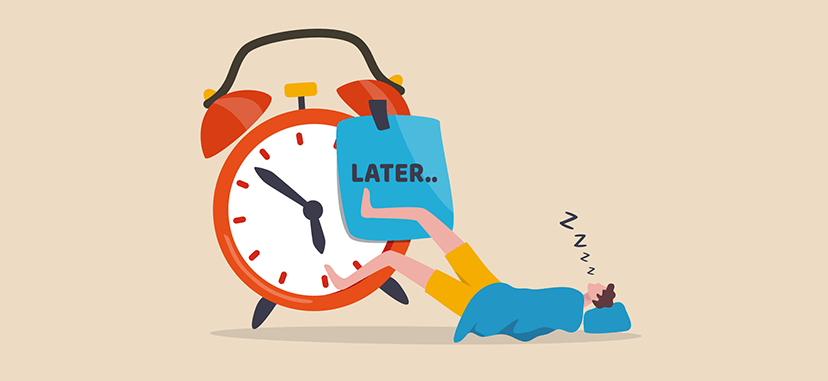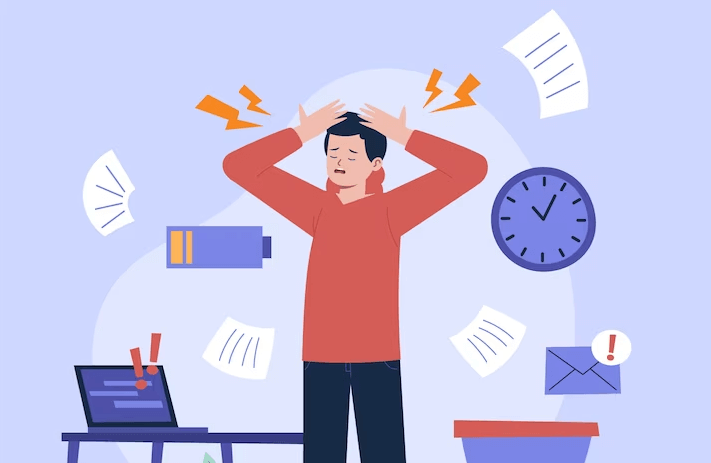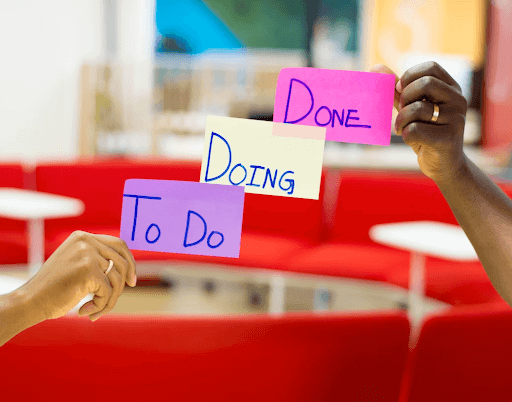
Click the button to start reading
How to Avoid Wasting Time at Work: Tips and Strategies
Have you ever fallen down the Internet rabbit hole, only to look up and realize you “lost” a huge chunk of time – and didn’t even realize it? Or found yourself mindlessly procrastinating, while promising yourself that you’d get back to work “soon”?
Unfortunately, we’ve all been there. But what you might not realize is just how much time you’re actually wasting at work, and the impact it’s having on your productivity and success.
In this article, we’ll get into that before discussing some of the causes of wasted time at work, as well as how wasted time affects employees and employers alike. Of course along the way, we’ll also provide you with plenty of tips and tools, so you can quit wasting time at work and maximize your productivity.
To kick things off, let’s take a look at how wasting time might be affecting your career …

The Impact of Wasted Time at Work
Let’s be real: we all have days where we feel like we’re busy but not actually getting anything real done. Maybe you’ve spent hours in meetings that didn’t really require your presence, or you’ve found yourself scrolling aimlessly through social media when you should’ve been working on an important project.
While it might not seem like a big deal in the moment, wasted time at work can have a serious impact on your productivity and career success. Think about it: every minute you spend on a task that doesn’t move you closer to your goals is a minute that could be better spent on something else.
And over time, those minutes add up to hours, days, and even weeks of lost productivity. This not only affects your ability to achieve your goals, but it can also have a negative impact on your mental health, stress levels, and job satisfaction.
But it’s not just about the time you’re wasting – it’s also about the opportunity cost of that time. For example, if you spend an hour scrolling through social media instead of working on a project, that hour could have been spent completing the project and impressing your boss – in other words, spending time on activities that could potentially lead to a promotion or new opportunity.
Bottom line? Wasted time at work doesn’t just impact your current productivity – it also affects your future potential.
To overcome that likelihood, in the next section we’ll look at some of the main reasons you might be wasting time at work, since you can’t fix a problem without first identifying what’s causing it.

Causes of Wasted Time at Work
There are 3 main culprits that cause us to waste time at work: personal technology, workplace distractions, and lack of motivation. Let’s look at each of those in greater depth, so you can discover what rings most true for you.
Personal Technology Use
As you already know, personal technology can be a huge source of distraction at work. Whether you’re checking your phone for notifications, scrolling through social media, or watching videos online, technology can quickly eat away at your productivity. And while it’s important to take breaks and recharge throughout the day, it’s easy to fall into the trap of mindless scrolling and waste valuable work time.
Distractions in the Workplace
Distractions in the workplace can come in many forms, from chatty co-workers to loud construction outside your window. And while working from home may eliminate those distractions, it often creates new ones in the form of unruly children, beckoning household chores, and needy pets!
Lack of Focus and Motivation
Sometimes, the biggest cause of wasted time at work is simply a lack of focus or motivation. Maybe you’re feeling overwhelmed by a project or you’re just not inspired by your work. Whatever the cause, it’s important to identify and address these issues in order to stay productive.
As you can see, there are several different reasons you might be inclined to waste time in the workplace. And, while we’ve touched a little bit on how wasting time at work can affect your career, the effects have the potential to be even farther reaching than that!
Let’s take a look …

How Wasted Time at Work Affects Employees
Research shows that wasting time at work doesn’t just impact your productivity, it also has an effect on everything from your job satisfaction to your outlook. In this section, we’ll explain in greater depth, just why that is.
Reduced Productivity
When you waste time at work, you’re not only failing to accomplish tasks – you’re also reducing your overall productivity. In fact, according to a survey by America Online and Survey.com, American employees waste an average of 2+ hours each day on unproductive tasks, resulting in a significant loss of productivity for both the individual and the company.
To compound the problem, a study by the University of California found that it takes an average of 23 minutes (!) to regain focus after being distracted, further highlighting the negative impact of wasted time on productivity.
Increased Stress and Anxiety
Wasted time at work can also have a significant impact on your mental health by creating unnecessary stress. And unfortunately, work-related stress can lead to a variety of negative health outcomes, including increased risk of heart disease, depression, and anxiety.
Additionally, when you waste time at work, you may feel like you’re not accomplishing enough – leading to feelings of stress, anxiety, and even burnout.
Decreased Job Satisfaction
When you’re not productive at work, it can also lead to decreased job satisfaction. For instance, research shows that employees who feel like they’re making progress on meaningful work are more satisfied with their jobs than those who feel like they’re wasting time.
Additionally, when you waste time at work, you may feel like you’re not contributing to the team or making a meaningful impact, further reducing job satisfaction.
Negative Impact on Career Growth
Finally, wasted time at work can have a negative impact on your long-term career growth. When you’re not productive, you may miss out on important opportunities for advancement or career development.
Additionally, if you consistently fail to meet deadlines or deliver high-quality work, you may develop a reputation as an unreliable or unproductive employee, which can limit your career prospects.

How Wasted Time at Work Affects Employers
Wasted time at work doesn’t just affect employees – it also has a significant impact on businesses, and in this section, we’ll take a closer look at how wasted time affects them.
Reduced Productivity
When employees waste time at work, it directly impacts their productivity and efficiency. This can lead to missed deadlines, lower quality work, and ultimately, reduced profitability for the business. In fact, it’s estimated that American businesses lose more than $1 billion every year due to wasted time and productivity.
Increased Costs
Wasted time can also lead to increased costs for employers. For example, if employees are spending too much time on unimportant tasks, they may not be focusing on revenue-generating activities that are essential for business growth.
Additionally, if employees are not using their time efficiently, it may require hiring additional staff to compensate for the lost productivity.
Lower Employee Morale
When employees are not productive at work, it can lead to lower morale and job satisfaction. This can lead to increased absenteeism and turnover, which can be costly for employers in terms of recruiting and training new employees.
Additionally, when employees feel like they’re wasting time, they may become disengaged and less motivated, which can further exacerbate the problem.
Negative Impact on Company Culture
Wasted time can also have a negative impact on company culture. When employees are not productive or engaged in their work, it can lead to a toxic work environment where employees are not motivated to collaborate and work together. This can lead to decreased morale, increased conflicts, and decreased overall productivity for the business.
Of course, businesses can take steps to address this issue and improve productivity and profitability by implementing time management tools, providing training and support to employees, and creating a culture that values productivity and efficiency.
Additionally, by using a team management tool like Teamly to track employee productivity and address areas where time is being wasted, companies can identify areas for improvement and make strategic changes to improve their bottom line.

Strategies to Avoid Wasting Time at Work
While what you’ve read to this point may come across as dire, the good news is that we have plenty of suggestions for helping you avoid wasting time at work! That’s what we’ll tackle here, starting with some tips for better time management.
Time Management Techniques
Time management is a critical skill that can help you stay focused and productive throughout the day. One of the most effective time management techniques is to prioritize tasks based on their importance and urgency.
This means focusing on the most important and time-sensitive tasks first, and then working on less important tasks as time allows. To help with this, you can create a to-do list and prioritize your tasks based on their level of importance.
Another effective time management technique is to break down large projects into smaller tasks. This can help make large projects feel more manageable, and can also help you stay focused on one task at a time.
By breaking down projects into smaller tasks, you can also set specific deadlines for each task, which can help you stay on track and avoid procrastination.
Finally, using tools like the Pomodoro Technique can help you stay focused and productive throughout the day. This technique involves working in focused 25-minute intervals, followed by short breaks in between. By working in short intervals, you can avoid burnout and stay focused on your tasks.
Creating a Productive Workspace
Creating a productive workspace is essential for staying focused and avoiding wasted time at work. This includes minimizing distractions, such as noise and interruptions, and creating a clean and organized workspace.
When your workspace is cluttered and disorganized, it can be difficult to stay focused and productive. Consider investing in storage solutions and organization tools to help keep your workspace tidy and free from distractions.
In addition to minimizing distractions, it’s also important to ensure that your workspace is properly lit and ergonomic. Poor lighting can cause eye strain and headaches, while an ergonomic workspace can help reduce the risk of back pain and other injuries.
If you work from home, consider investing in a comfortable chair and a desk that’s at the proper height, and adjust your lighting to minimize glare and eye strain.
To the best of your ability, you’ll also want to separate your workspace from the main living area in your home, so you can minimize distractions while maintaining a productive, “work-oriented” mindset.
Developing a Positive Mindset
Finally, cultivating a positive mindset is crucial for making the most of your time at work and ensuring that you approach tasks and assignments with enthusiasm and dedication.
To think more positively at work, we suggest trying one or more of the following strategies:
- Practice gratitude – Taking time to appreciate the positives in your work can help shift your perspective and make you feel more motivated. Make it a habit to regularly identify aspects of your job that you’re grateful for, whether it’s the opportunity to learn new skills or the support of your colleagues.
- Visualize success – Before embarking on a task or project, take a moment to imagine yourself completing it successfully. Visualizing positive outcomes can boost your self-confidence and help you approach your work with a more optimistic attitude.
- Reframe challenges – When faced with obstacles, try to see them as opportunities for growth and learning. Embrace challenges as a chance to develop new skills or discover innovative solutions, rather than viewing them as insurmountable barriers.
- Surround yourself with positivity – Engage with colleagues who have a positive outlook and can help lift your spirits when you’re feeling overwhelmed. Sharing experiences and encouragement with like-minded individuals can be a powerful way to maintain a positive mindset at work.
By focusing on these strategies, you can foster a more optimistic and proactive attitude towards your work, helping you make the most of your time and achieve greater success in your career.

5 Tools to Help You Avoid Wasting Time at Work
In today’s digital age, there are countless productivity apps and software tools available to help you stay focused and avoid wasting time at work.
Some popular options include:
- RescueTime – RescueTime is a time tracking and productivity app that helps you understand how you’re spending your time at work. It tracks the time you spend on different websites and applications, and provides detailed reports and analytics to help you identify areas where you’re wasting time. Additionally, it offers tools like focus time sessions and goal tracking to help you stay on track and increase your productivity.
- Forest – Forest is a productivity app that uses gamification to help you stay focused and avoid distractions. The app encourages you to stay off your phone and stay focused on your work by “planting a tree” every time you start a work session.
The longer you stay focused, the more your virtual forest grows. If you leave the app or start using your phone during a session, your tree dies, providing a fun and motivating way to stay focused and avoid distractions.
- Focus@Will – Focus@Will is a music app that uses neuroscience-based music programming to help you stay focused and productive. The app offers a variety of music channels designed to improve focus, including classical, jazz, and ambient music.
Additionally, it uses a patented algorithm to adjust the music to match your brain’s natural focus rhythms, providing a highly personalized and effective way to stay productive.
- Focus Booster – Focus Booster is a time management app that uses the Pomodoro Technique to help you stay focused and productive. The app breaks your workday into 25-minute work sessions, with short breaks in between, to help you stay focused and avoid distractions.
Additionally, it provides detailed reports and analytics to help you track your productivity and identify areas where you can improve.
- Cold Turkey – Cold Turkey is an app that allows you to block distracting websites and applications during work hours. The app lets you create custom blocklists of websites and applications that you find distracting and allows you to set specific times when those sites and apps are blocked.
Additionally, it offers a variety of customization options, such as the ability to block specific pages within a website, to help you stay focused and productive.
By incorporating productivity apps into your daily routine, you can stay organized, remain on track, and avoid wasting time on unimportant tasks.
Conclusion: Take Action to Avoid Wasting Time at Work
In today’s fast-paced world, wasted time at work can be a significant issue for both employees and employers. From browsing social media to attending unproductive meetings, it’s all too easy to let distractions get in the way of productivity and success.
However, by taking action to address this issue, you can set yourself up for success and achieve your goals both at work and in life. Throughout this article, we’ve explored some of the key causes and effects of wasted time at work, as well as strategies and tools to help you avoid this issue.
We’ve also explored the impact of wasted time on employers and businesses, including reduced productivity, increased costs, and negative effects on company culture.
Yet perhaps the most important takeaway from this article is that in order to avoid wasting time at work, you’ll want to adopt a proactive approach. This may involve setting specific goals and deadlines, identifying and minimizing distractions, and utilizing productivity tools and resources. Additionally, it may involve seeking support from colleagues, managers, or coaches to help you stay on track and achieve your goals.
Ultimately, the key to avoiding wasted time at work is to take action. Whether you’re an employee looking to improve your productivity and advance your career, or an employer seeking to improve your business’ bottom line, it’s never too late to take steps to address this issue.
So, as you move forward in your workday and beyond, remember the importance of staying focused, productive, and motivated. By taking action to avoid wasted time at work, you can achieve your goals, advance your career, and make a meaningful impact in your work and in the world!
















